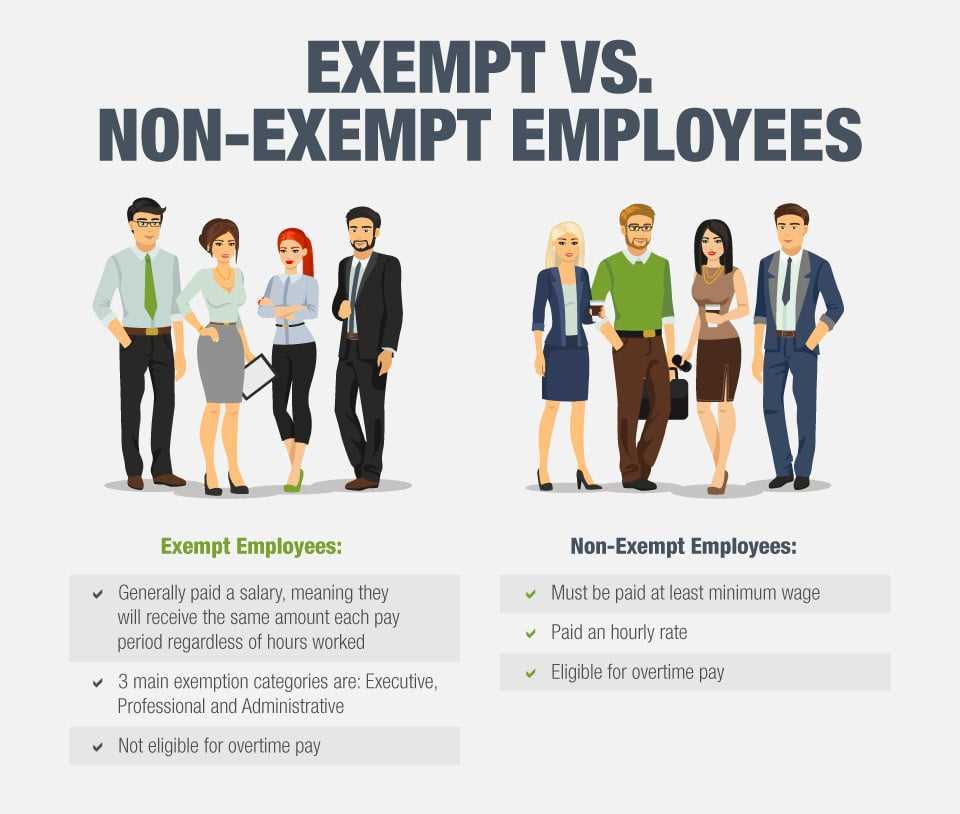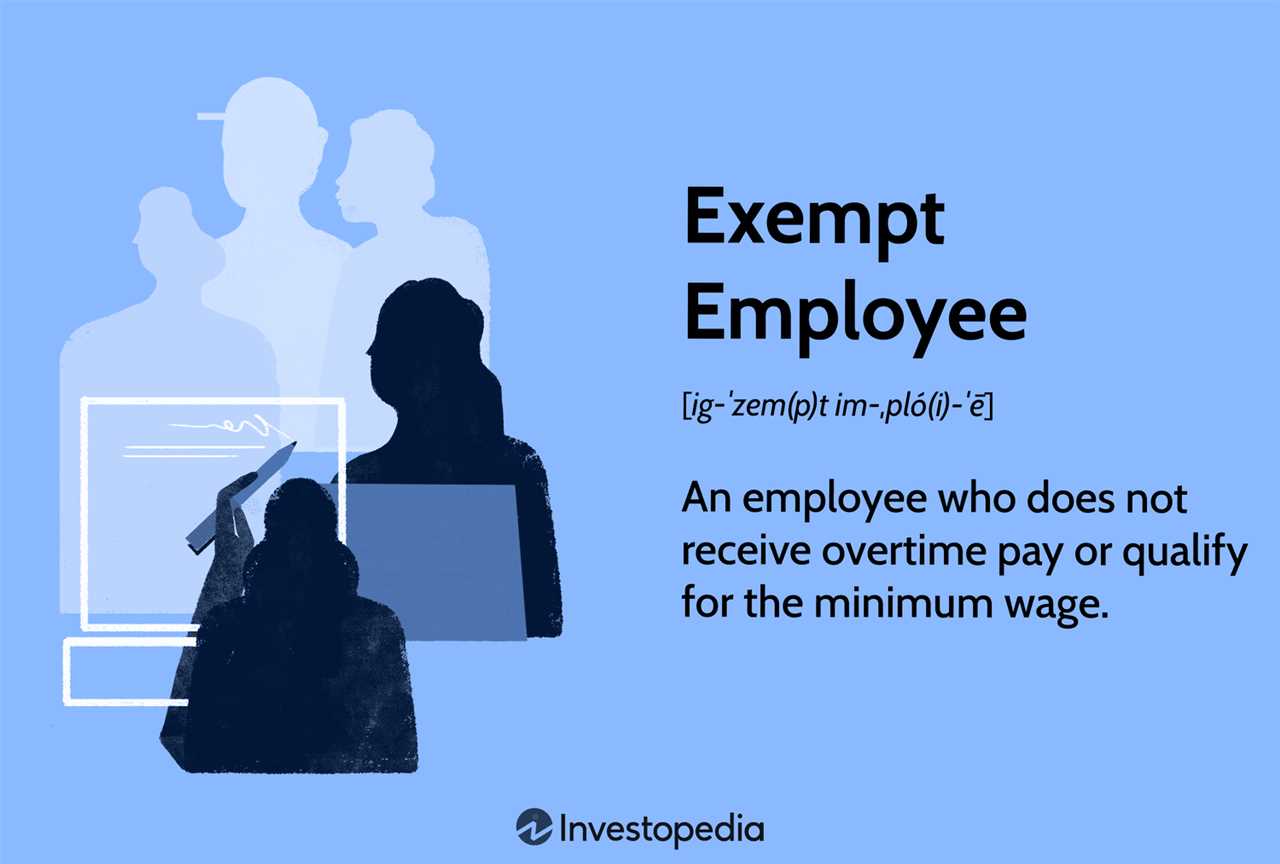What Does it Mean to be an Exempt Employee?
An exempt employee is a classification given to certain employees who are exempt from certain labor laws, particularly those related to overtime pay. This classification is typically reserved for employees who meet specific criteria set by the Fair Labor Standards Act (FLSA) in the United States.
To be considered an exempt employee, an individual must meet certain requirements, including being paid on a salary basis and performing specific job duties. The FLSA outlines several categories of exempt employees, including executive, administrative, professional, and outside sales employees.
Exempt employees are typically paid a fixed salary rather than an hourly wage. This means that regardless of the number of hours worked, exempt employees receive the same amount of pay. They are not entitled to overtime pay for working more than 40 hours in a week, unlike non-exempt employees.
Additionally, exempt employees are expected to perform certain job duties that are considered to be of a higher level or require specialized knowledge. These duties may include managing other employees, making important business decisions, or performing work that requires advanced education or training.
Being classified as an exempt employee can have both advantages and disadvantages. On one hand, exempt employees have the benefit of a stable salary and may have more flexibility in their work schedule. They may also have more opportunities for career advancement and higher earning potential.
However, being exempt also means that these employees may not be eligible for certain benefits and protections that non-exempt employees receive. For example, exempt employees may not be entitled to overtime pay, meal and rest breaks, or certain employment rights provided by labor laws.
The Pros of Being an Exempt Employee
Being classified as an exempt employee in the workplace comes with several advantages. Here are some of the pros of being an exempt employee:
1. Higher Salary
Exempt employees are typically paid a higher salary compared to non-exempt employees. This is because exempt employees are not eligible for overtime pay, so their salary is designed to compensate for the additional hours they may work.
2. Flexibility
Exempt employees often have more flexibility in their work schedule compared to non-exempt employees. They may have the freedom to set their own hours and work remotely, allowing for a better work-life balance.
3. Advancement Opportunities

Exempt employees often have more opportunities for career advancement within their organization. Since exempt positions are typically higher-level roles, they may come with more responsibilities and opportunities for growth.
4. Autonomy
Exempt employees often have more autonomy in their work compared to non-exempt employees. They may have the authority to make decisions and take ownership of projects, which can be empowering and fulfilling.
5. Additional Benefits
Exempt employees may be eligible for additional benefits such as healthcare, retirement plans, and paid time off. These benefits can contribute to a higher overall compensation package and improve job satisfaction.
| Pros of Being an Exempt Employee |
|---|
| Higher Salary |
| Flexibility |
| Advancement Opportunities |
| Autonomy |
| Additional Benefits |
The Cons of Being an Exempt Employee
While being an exempt employee may come with certain advantages, there are also some disadvantages to consider. Here are some of the cons of being an exempt employee:
1. Lack of overtime pay
One of the main drawbacks of being an exempt employee is that you are not entitled to overtime pay. Unlike non-exempt employees who receive overtime compensation for working more than 40 hours a week, exempt employees are not eligible for this additional pay. This means that even if you work long hours or put in extra effort, you won’t receive any extra compensation for your time.
2. Limited work-life balance

Exempt employees often find themselves working long hours or being on call outside of regular working hours. This can lead to a lack of work-life balance, as you may have to sacrifice personal time or family commitments to meet work demands. The expectation to always be available and responsive can be stressful and can negatively impact your overall well-being.
3. Higher job expectations
As an exempt employee, you are typically expected to take on more responsibilities and have a higher level of accountability compared to non-exempt employees. This can mean having to handle more complex tasks, manage projects, or make important decisions. While this can be a great opportunity for career growth, it can also lead to increased pressure and stress.
4. Limited flexibility
Exempt employees often have less flexibility in terms of their work schedule compared to non-exempt employees. They may be required to adhere to set working hours or be on call during specific times. This lack of flexibility can make it challenging to manage personal commitments or take time off when needed.
5. Potential for burnout
Due to the combination of long hours, high job expectations, and limited work-life balance, being an exempt employee can increase the risk of burnout. Burnout is a state of chronic stress that can lead to physical and mental exhaustion, decreased productivity, and decreased job satisfaction. It is important for exempt employees to prioritize self-care and establish boundaries to prevent burnout.
Overall, while being an exempt employee may come with certain benefits, it is important to consider the potential drawbacks. It is essential to weigh the pros and cons and determine if the exempt status aligns with your career goals and personal priorities.

Emily Bibb simplifies finance through bestselling books and articles, bridging complex concepts for everyday understanding. Engaging audiences via social media, she shares insights for financial success. Active in seminars and philanthropy, Bibb aims to create a more financially informed society, driven by her passion for empowering others.
